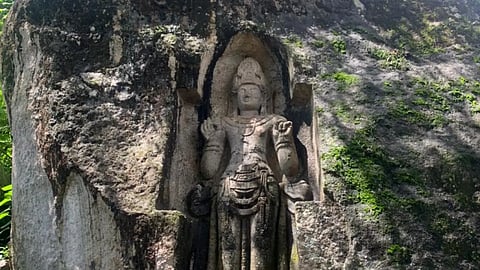On a clear and sultry November morning, I wake up to peacocks prancing around outside my villa at Cape Weligama, their feathers glistening in the sunlight that pours in from the window panes. Three days in Srilanka has done wonders for my sleep; I no longer wake up groggy and tired, but I can feel a slight headache in the making, all credit to the Arrack cocktails they served at sundowner cocktail hour the night before.
A Day In Weligama’s Corner
On a sojourn to Sri Lanka, a writer immerses herself in the surf and turf life of the sandy town of Weligama
Beyond the dancing peacocks is the clear coast and the azure blue of the Indian Ocean. A fishing hamlet turned surfing paradise, Weligama is calm and abuzz, all at once. And there is much to do, even in a small town that is best seen in a Tuk Tuk. With a day in hand and an itinerary that promises to enthrall the traveller in us, we head out, to look for the heart of the city.
Meet the potters
A short drive from Cape Weligama, we find ourselves at the gate of an almost dilapidated albeit large house, filled with people, cats, and a squirrel, all at once. Nalini, the owner of the home, welcomes us with a toothy smile, beckoning us to her clay workstation.

Sri Lanka’s pottery industry has thrived for centuries in these villages that practised the trade, before cruel hands of time dimmed the light on these ageless inheritances. But watching Nalini’s hand sweetly shape the clay at the wheel is both melancholic and therapeutic. She makes earthenware of all shapes and sizes; we spot piggy banks in the shape of a lion, cups as well as a new eco-friendly clay oil diffuser that she is still trying to perfect. Clay items are intrinsically linked to the Srilankan kitchen, finding space in regular cookware. Our host, who has been at the art for over 40 years, is keen to pass the art down to her family, with each member contributing to some part of the process.

We pick up an earthen pot and ask for its price. Nalini refuses to charge anything, a mark of love and hospitality that Srilankans are known for. We persist, finally managing to convince her to charge us, before departing from her home, an earthen oasis.
Standing rock tall
At the western end of town is a statue that abuts the main road, and lies in an obscure park that would escape your notice if you don’t go looking for it. Kushtarajagala is, we are told, one of the most popular tourist attractions in the city, believed to have existed from the period of 7-9th century.

Made from solid rock, there are different origin tales of the structure. The name, however, comes from the name of a king who had recovered from leprosy in this exact spot, spurring belief that the place has healing powers. Even today, people come to this garden with earthen lamps and flowers, and offer them to the deity set in stone.
We walk around for a bit, obscured from the road by bushes and tall trees. The masonry on the structure is precise but cracks in places, making it both real and divine. There is little here that dulls the silence and peace, except raucous laughter from a ground across the road, which is both a cricket field and a helipad.
Surfer’s delights
It is almost evening when we finally reach the most tempting leg of our sojourn - the beach. Weligama, which translates to ‘sandy village’, has turned into a lively beach, quite appropriately living up to its name. The beachfront is buzzing with sellers stocked to the brim with the freshest of ocean delicacies. In front of us, youngsters pick up their surfboards and venture out into the waters, hoping to catch a big wave.

The waves in Weligama bay are perfect for learning to surf, aided by the near perfect water conditions all year round. This has promoted a flurry of surf schools to pitch camp at the beach; we spotted over a dozen boards of schools promising lessons to both beginners and more advanced surfers. I am a nervous wreck, with my hydrophobia at its peak, as I see waves swallow surfers, only for them to emerge unscatched, laughing with unbridled joy.
I can’t say for the surfers, but the mere sight of their exhausting hydro-endeavours ignites hunger pangs in me, and as we look to refuel before heading back to the resort, the setting sun draws a near perfect ombre across the sky, tempting me to dip my feet in the waters, before I bid it goodbye. And I gladly obey.